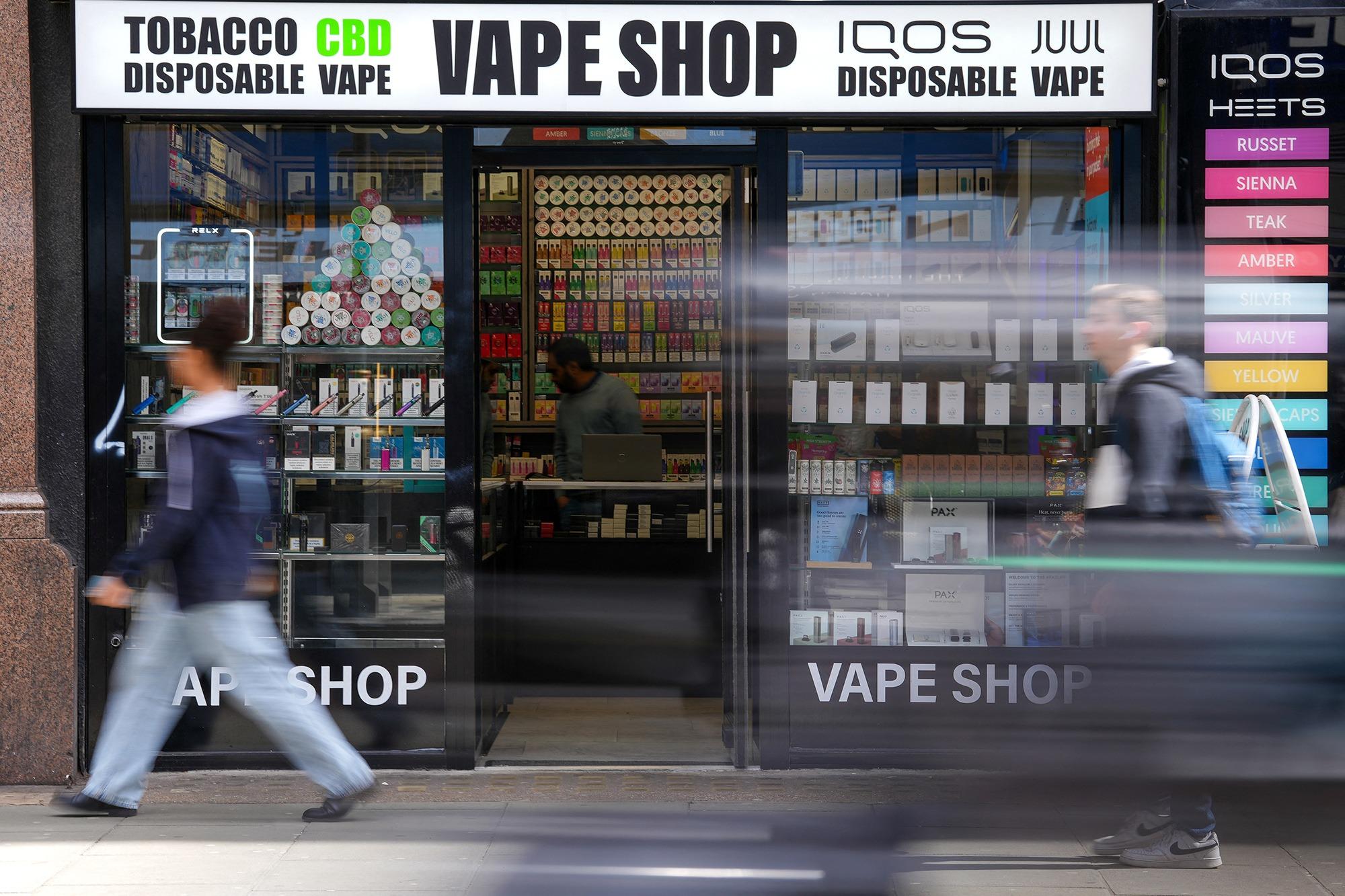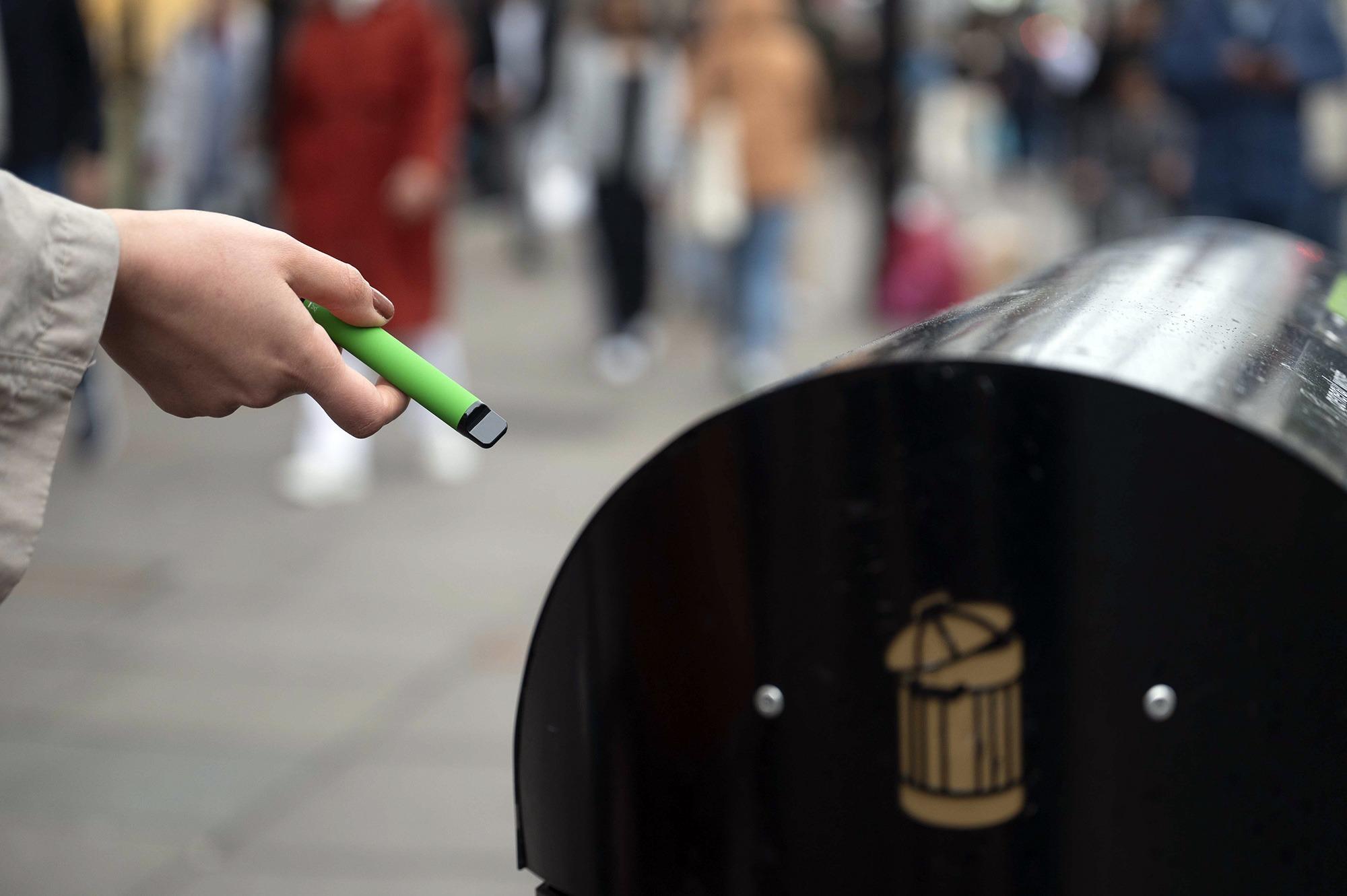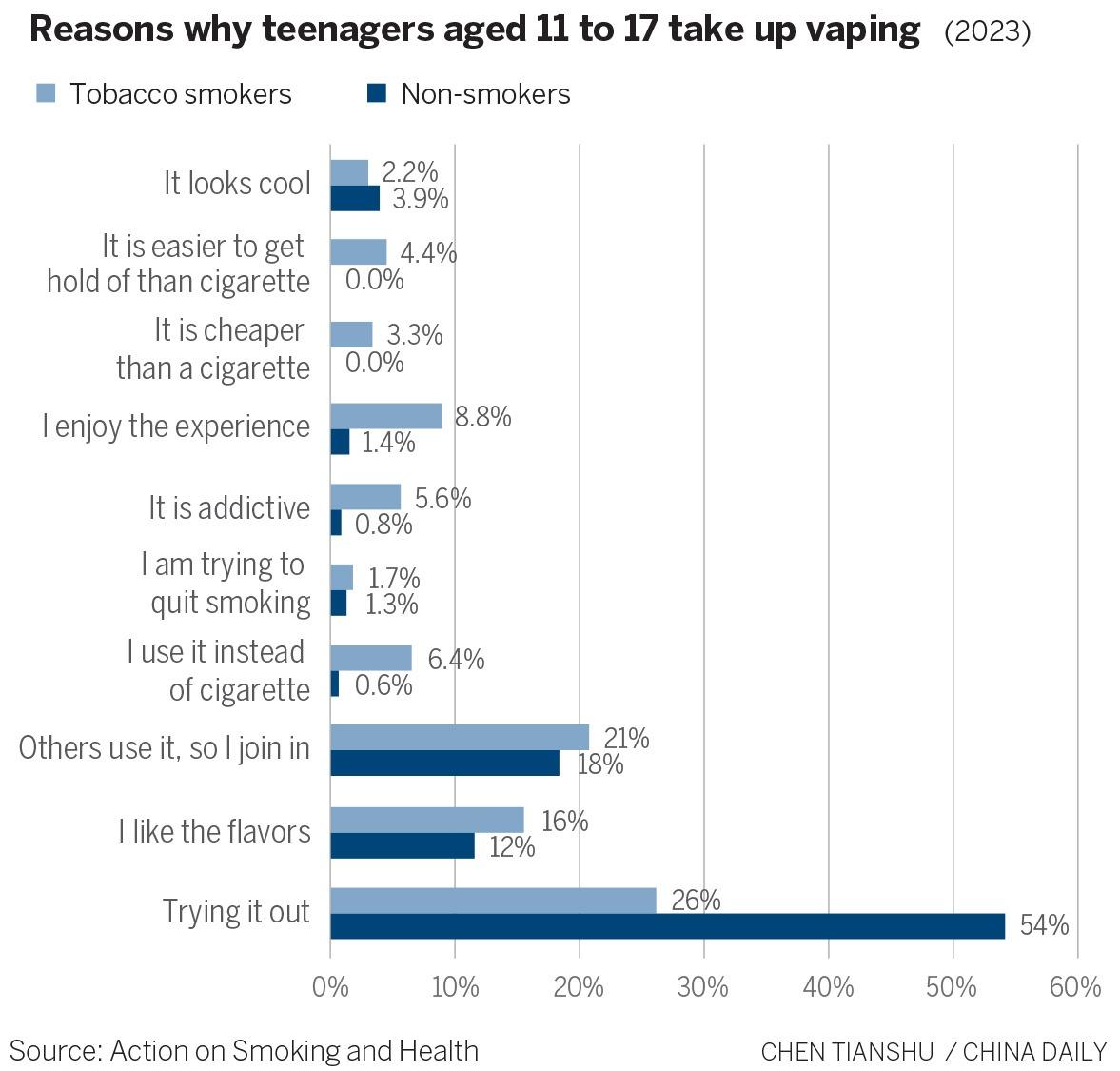Usage a global concern over its addictive potential and insufficient regulation
 People walk past a vape shop in central London on April 11, 2023. One in five British teenagers aged 11-17 have experimented with vaping, with nearly 70 percent favoring disposable vapes as their most frequently used device, according to research from the London-based public health charity Action on Smoking and Health. (PHOTO / REUTERS)
People walk past a vape shop in central London on April 11, 2023. One in five British teenagers aged 11-17 have experimented with vaping, with nearly 70 percent favoring disposable vapes as their most frequently used device, according to research from the London-based public health charity Action on Smoking and Health. (PHOTO / REUTERS)
Editor's note: As countries mull on measures to stave off the rise in vape culture among their youth, China Daily delves into the reasons behind the puff to find out if switching to e-cigarettes is indeed a lesser evil, or a gateway to a world of potentially new, unknown health risks.
Curiosity, the allure of enticing flavors and the convenience of discreet indoor use are among the reasons that attract young people to try out vaping.
But some may not know that addiction lurks in the shadows, as they are seduced by the ease of indulging in a puff anytime, anywhere.
Opinions diverge among young vapers when it comes to assessing the harm of vaping, according to research from the UK lobby and campaign group Action on Smoking and Health, or ASH.
Some ardently believe vaping offers a safer alternative to smoking tobacco and are encouraged by claims of reduced harm when compared to traditional cigarettes.
Others, however, harbor concerns about the comparable levels of harm posed by both practices. But a recurring thread weaves through their stories — the addictive nature of nicotine.
Disposable vapes have become a ubiquitous presence with their sleek design, easy accessibility and affordability, contributing to their surging popularity.
Initially, smoking and vaping were declining among young people aged 18 to 24 in the United Kingdom. However, with the introduction of disposable vapes, the numbers have sharply increased.
According to a survey by ASH this year, one in five teenagers aged 11-17 in the UK have experimented with vaping, with nearly 70 percent favoring disposable vapes as their most frequently used device. Similar patterns are being reported worldwide.
And in the United States, the Centers for Disease Control and Prevention highlighted in its annual National Youth Tobacco Survey that disposable vapes were the most prevalent type of e-cigarette used by young people nationwide.
In a foreword for a UK policy paper, Chris Whitty, chief medical officer for England, said the message from health authorities so far has been clear, "If you smoke, switch to vaping; if you don't smoke, refrain from vaping."
Data from the past five years have shown that, despite the desire of most smokers to quit, nicotine addiction acquired during teenage years holds them captive, he said, and this is why governments are increasingly looking at regulating vapes marketed for children and teenagers.
It is evident from the comments made by experts and from the surveys that vaping has transcended mere trend status, prompting debate about the long-term consequences for individuals, communities and ecosystems.
Zefar, 24, from London, who started vaping a few months ago, told China Daily the habit was a healthier alternative to smoking.
"I'm conscious of the association I've made between relaxing and vaping, so for those that are addicted, it can be a result of this psychological connection between the two," he said.
"It has the potential to be less harmful, however, I've noticed that for most of my friends and colleagues, it's increased the frequency with which they have access. Friends that vape more frequently have begun to present symptoms of long-term health problems, including things like a persistent cough due to irritated or inflamed airways.
"Vapes are also less well-regulated than smoking at the moment, which means mass produced, cheaply made and cheaply sold low-quality vapes have flooded the market, often with moderate and serious design defects, that have a greater impact on the health of their users."
 A person holds a vape in London on Aug 8, 2023. The soaring popularity of disposable vapes has sparked a sense of urgency among countries, with medical experts calling for bans. (PHOTO / REUTERS)
A person holds a vape in London on Aug 8, 2023. The soaring popularity of disposable vapes has sparked a sense of urgency among countries, with medical experts calling for bans. (PHOTO / REUTERS)
Alex Franco, 23, from Italy, said he started vaping at 16 out of curiosity and because of the "benefits" he gets from it in comparison to smoking traditional tobacco.
"Vaping is definitely less harmful, (but) it's not harmless because, of course, you're putting substances in your body that are toxic anyway," Franco told China Daily. "More than quitting vaping, I'd say that I'm constantly thinking about quitting smoking tobacco."
Maria, a 23-year-old from Ireland, started vaping at 21.
"I think the act of vaping and the variety of flavors are the addictive part."
She told China Daily she believes the health effects of smoking vapes compared to cigarettes are similar.
"I feel like, with the electric cigarettes, you are inhaling a lot of chemicals through the batteries, and whatever is in the e-cigarette, while with the (tobacco) cigarettes you have (many) other chemical types," she said.
Convenience is a recurring theme among those interviewed.
Jennifer L., 23, from Germany, said she started vaping at 21.
"What made it addictive for me was the taste, and the convenience to not have to light a cigarette and smell like tobacco, just taking a puff whenever I desire," she said.
She said she believes vaping is more harmful than smoking traditional cigarettes because of the addiction potential, and considers quitting frequently.
"We are unsure exactly what the ingredients are, and how it will affect us in the long term," she said.
"I have a few friends that would never touch a cigarette, but empty a vape with 6,000 puffs in a day. I also think younger teenagers are more tempted by the flavors. Also it is more harmful for the environment since they are single-use and have a battery inside. They are often not thrown away correctly."
Bans urged
The soaring popularity of disposable vapes has sparked a sense of urgency among governments, with medical experts calling for bans.
European nations are following the lead of Australia and New Zealand and taking action to restrict young people's access to e-cigarettes and disposable vapes, as concerns mount about the worrying trend.
Belgium has banned online sales of e-cigarettes, with Ireland and France eyeing potential bans. And others, including the UK, are considering raising the age limit at which people can buy them.
Health authorities in Italy, Germany and France have measured an increase in vaping among young people in recent years. In some countries, the surge has been threefold. The upswing in popularity is worldwide and has prompted politicians and campaigners to push for policy changes.
E-cigarettes, which do not contain tobacco, heat liquids that are converted into an aerosol to create vapor.
Vaping serves as a tool to assist in quitting smoking traditional tobacco cigarettes, being a safer alternative, though not entirely risk-free, the World Health Organization said. Smoking tobacco cigarettes is known to significantly damage and cut short lives.
The long-term effects of vaping remain largely unknown, the WHO said, and all electronic nicotine delivery systems are under constant investigation.
The main health concern with vaping is that it could potentially introduce a new generation to nicotine addiction.
The global health authority adds that there is a lack of evidence supporting the safety of the devices, and the potential health risks associated with their users are largely unknown.
Examples of health issues recorded so far include respiratory problems, and in some severe cases, vaping has been linked to serious lung injuries, a condition known as EVALI, which stands for e-cigarette or vaping product use-associated lung injury.
Some recent studies suggest that vape use can also increase the risk of heart disease.
Vaping poses significant risks for young people in particular, the WHO said, because the nicotine in e-cigarettes can have harmful effects on the developing brain. It highlights that young people who use e-cigarettes are more likely to use traditional cigarettes in the future.

National plans
Disposable vapes will soon be banned in France as part of a national plan to combat smoking.
In September, French Prime Minister Elisabeth Borne said the government would "soon present a new national plan to fight against smoking with, in particular, the prohibition of disposable electronic cigarettes, the famous 'puffs', which give bad habits to young people".
There is concern that manufacturers are targeting teenagers, appealing to them with cheap disposable e-cigarettes containing sweet flavors, including candy, marshmallow and bubblegum.
Different strategies for tobacco and e-cigarette control are being deployed globally, shaped by each country's unique cultural, social and economic landscape.
More than 180 countries will gather in Panama early next year for the WHO Framework Convention on Tobacco Control, where potential regulations will be discussed, including potential rules for regulating vape sales. Following the convention, countries will consider adopting recommendations from it.
Australia has already banned all vaping without a prescription, and New Zealand has outlawed most disposable vapes and put curbs on marketing the products to children.
Leading doctors and councils in the UK have expressed support for an anticipated ban on single-use vapes in the country.
Steve Turner, registrar for the UK's Royal College of Paediatrics and Child Health, told The Guardian that medics are "really worried" about the surge in vaping among young people.
He said vapes were an "effective entry into nicotine addiction and smoking" and that the situation was "a public health disaster". "Children should not be becoming addicted to nicotine," Turner said.
Sarah Woolnough, chief executive at Asthma+ Lung UK, said: "If you're a smoker and you want to quit tobacco, vaping can be a helpful way to give up smoking. But for children and those who don't smoke, starting to vape isn't a good idea, especially if you have a lung condition."
However, there is resistance to policy change on vape sales in some quarters.
Lobby groups, including the European Tobacco Harm Reduction Advocates, warn that the key policy recommendations to be discussed in Panama would deny continued use of safer nicotine products for millions of European consumers who have successfully stopped smoking with the help of the products.
Those resistant to bans say a prohibition would only lead to a growing black market featuring products that are unregulated and uncontrolled. Instead, they would support more controls and limits around access for children and teenagers, and a proper licensing system to dictate who can sell vapes.
Andrej Kuttruf, chief executive of vape retailer Evapo, told China Daily vaping is "at least 95 percent less harmful than smoking and almost twice as effective as any other cessation solution", playing a vital role.
"In our view, disposable bans or flavor bans are not the solution and would be a tragic mistake," he said.
"Current laws already forbid sales to minors and these laws need enforcing. Without enforcement, no new regulations will have any impact. Bans will only lead to a thriving black market, taking the products out of the existing regulatory framework and safety controls and handing the market to the rogue players who currently violate the law."
Kuttruf said he believes the rise in vaping among young people is mainly caused by the wide proliferation of shops selling disposables and the lack of enforcement of age verification laws.
In line with the UK Vaping Industry Association, Evapo is asking for a licensing system to be introduced that is similar to the one related to alcohol sales, which would restrict products to licensed shops and specialized retailers, with strict age verification in place.
"We are also asking for drastic fines of up to 10,000 pounds ($12,670) for shops being found to sell to minors," Kuttruf said. "Repeated offenders would lose their license to sell."
Money raised through a licensing fee and from the increased fines could be put into enforcement to ensure existing laws are being adhered to.
"Instead of bans, we need restriction to access and enforcement to really solve the problem. Otherwise, kids will continue to buy from the black market," he said.
Philip Morris International, or PMI, the tobacco and vaping company behind Marlboro cigarettes, is waging a big lobbying campaign to prevent countries from cracking down on vapes and similar products.
The company made $10.19 billion in revenue last year from e-cigarettes and other smoke-free products such as heated tobacco devices.
Gregoire Verdeaux, PMI's senior vice-president of external affairs, described the agenda for the WHO's Panama meeting as a "prohibitionist attack" on smoke-free products.
In an email message sent to employees in September that was seen by The Guardian, he wrote that the WHO was set to compromise the "historic" opportunity for public health presented by "the recognition that smoke-free products, appropriately regulated, can accelerate the decline of smoking rates faster than tobacco control combined".
Zheng Wanyin in London contributed to this story.


